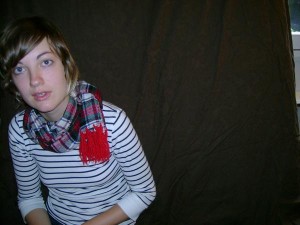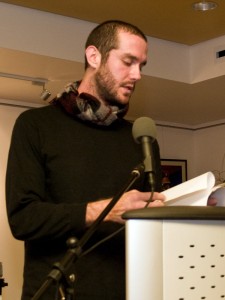Just posted video that I shot of Aaron Kunin’s excellent reading at the Poetic Research Bureau on Nov. 1.
http://www.youtube.com/watch?v=GUweaR79z58
Mon 16 Nov 2009
Just posted video that I shot of Aaron Kunin’s excellent reading at the Poetic Research Bureau on Nov. 1.
http://www.youtube.com/watch?v=GUweaR79z58
Sun 15 Nov 2009


Sunday, November 22, 2009 at 4:00pm
@ The Poetic Research Bureau
3706 San Fernando Blvd
Glendale, CA 91206
Doors open at 4:00pm
Reading starts at 4:30pm
$5 donation requested
Lindsey Boldt lives in San Francisco where she is a practicing poetess, cultural worker, vaudeville-style entertainer, elementary after-school teacher, human jukebox and assistant editor with The Post-Apollo Press. She is the author of the chapbook Oh My, Hell Yes and is currently working on two prose projects related to two very dated 80’s movies.
John Sakkis‘s first full length book, Rude Girl, is just out from BlazeVox Books. He is the author of numerous chapbooks including most recently: Gary Gygax, The Moveable Ones and Rude Girl. With Angelos Sakkis he translates the work of Athenian multimedia artist/ poet Demosthenes Agrafiotis; their translation of Agrafiotis’s Maribor is forthcoming from The Post-Apollo Press as well as Chinese Notebook forthcoming from Ugly Duckling Presse. Recent work has appeared in Area Sneaks, Action, Yes and Octopus. He lives in the Lower Haight and works at Small Press Distribution in Berkeley.
Sun 15 Nov 2009
This is the first paid advertisement for Free Space Comix: The Blog. Of course, I’m not being paid for it; Matthew will just owe me. Virtual capital!

CREDIT by Mathew Timmons
Just Released from Blanc Press in Los Angeles!
CREDIT by Mathew Timmons
Hardcover, 800 pages, full color
Blanc Press, September 2009
ISBN-13: 978-0-9814623-4-9
Dimensions: 11 × 8.5 × 1.75 inches
Price (w/o shipping): $199.99
Download price: $299.99
CREDIT is an 800 page, large format, full color, hardbound book, available for $199.99 from Blanc Press in Los Angeles–the longest, most expensive book publishable through the online service, lulu.com. Divided into two sections, Part A: Credit–26 parts (a-z) and Part 2: Debit–10 parts (1-10), CREDIT is a highly revealing and emotional work chronicling a personal tale of credit.
In late spring 2007 as an irrational exuberance and promise of financial fortune hung in the air, mailboxes were filled with generous and gracefully worded offers of credit. Just over two years later, in midsummer 2009, the shape of the financial environment changed radically and mailboxes still filled up with statements of credit. Something had to change, offer turned to obligation.
Retailing for $199.99, CREDIT is a book the author himself lacks the cash or credit to buy.
Mathew Timmons’ CREDIT has been roundly praised by a number of artists, writers, editors and critics, including:
Harold Abramowitz, Stan Apps, Marcus Civin, Brian Joseph Davis, Ryan Daley, Craig Dworkin, Brad Fliss, Lawrence Giffin, James Hoff, Maximus Kim, Matthew Klane, Janne Larsen, Matthias Merkel Hess, William Moor, Joseph Mosconi, Holly Myers, Sawako Nakayasu, Sianne Ngai, Ariel Pink, Vanessa Place, Dan Richert, Ronald Quinn Rudlong Jr., Ara Shirinyan, Danny Snelson, Erika Staiti, Brian Kim Stefans, Robert Summers, Rodrigo Toscano, Matias Viegener and Steven Zultanski.
Read Advance Praise for Mathew Timmons’ CREDIT.
View Images from Mathew Timmons’ CREDIT.
Read Advance Praise for Mathew Timmons’ CREDIT:
Let’s face it, only those who see the invisible can do the impossible. However, miraculously, and right on cue, just short of a decade into the 21st century, Mathew Timmons has given us a momentous, lucid, and gripping book that makes visible what used to be, exclusively, invisible, the wide terrain of credit. Buy “ CREDIT,†tell your friends to buy it, and take its lessons to heart: Credit is expensive!… Credit is not cheap… Credit is hard, not easy, to get…
—Harold Abramowitz
If you want to pay a penny for a thought Mathew Timmons has 19,999 of them, but like Master Card suggests, Timmons keeps it simple. CREDIT is a work ripped from both the headlines and the mailbox.
—Brian Joseph Davis
I will send a very special, one-of-a-kind, only-available-via-purchase-and-full-completion and proof-of-reading-of-this-book, to all who purchase and read this book. Offer not valid in Kentucky.
—Sawako Nakayasu
CREDIT by Mathew Timmons captures the entire postmodern economy under one cover. Like an avalanche of fine print, CREDIT reveals absolutely everything required to be disclosed by law. Timmons aestheticizes the angst of indebtedness into a colorful durational novel, complete with a lifetime supply of rate, fee, and grace period information, plus all the “__ _ !lI†•••••••• •••••••• & •• ‘.â€~.’lf ’ CIa … “ of modern life. This is a book “that do_es lL all for you†and best of all “_.s:ard ~ith _no annu~lJee.â€
—Stan Apps
Mathew Timmons’ CREDIT: Approved.
—Sianne Ngai
The output is a sprawling, modular form-letter with all the personal/financial affirmation cut down through razorbladed erasure-transcoding. CREDIT’s procedure traces an unfollowable map from the macrodistortion of mass-market advertising onslaught to a subjective microdistortion of noise stream granulation and reassembly. CREDIT is problematic in terms of numbers, transaction, hardware and software. The text’s operation is ravenously lossy, feeding on filtering byproducts and mistranslation; emphasis on information loss/breakage makes the text self-genotoxic and it sprouts mutant poetry from attractive shapes and corners. The text can be rotated. CREDIT is unreadable and CREDIT is a vibrant autobiography and CREDIT is a rainbow dream.
—Dan Richert
What kind of Art would Human this kind of Receipt?
What kind of Receipt would Art this kind of Human?
What kind of Human would Receipt this kind of Art?
What kind of Art would Receipt this kind of Human?
What kind of Receipt would Human this kind of Art?
Fuckers.
—Rodrigo Toscano
Quite possibly the oldest system of exchange, credit is almost inseparable from wealth. Credit is the laxative to the stubborn bulk of capital. Similarly, how easy can form be separated from content? Or is content itself a kind of para-form? Paraformaldehyde, even? Disinfectant indicating content’s historicity in its obliteration? Content is form not yet recognized as such. Content is form on credit. And it is to Timmons’ credit that he seems to be particularly susceptible to this confusion, bombarded as he seems to be with offers. And though credit and wealth may be interchangeable to the point of identity, still Timmons is all the more duped for believing so.
—Lawrence Giffin
Not since “The Tzanck Check†has a work so conscioned the infra-thin of capitalism—a tour de fort-da.
—Vanessa Place
This work could have easily been called “Laborâ€â€”like “Credit,†one of the least understood, least visible of our foundational abstractions. (“Milk†might be the other.) Mathew Timmons has managed to squeeze a Dummy’s Guide of both into a mere 800 pages. Sure, this is art in the age of digital reproduction, but you’re not getting anywhere near this thing.
—Brian Kim Stefans
It seems only natural that with this book I re-appropriate a blurb about another book (Fiona Banner’s The Nam):
“It has been described as unreadable.â€
—James Hoff
Congratulations! You’ve been preselected to apply for a copy of the new book by Mathew Timmons at a low introductory rate of just 199.99 and no annual fee ever. Documenting the social and economic space defined by the writing that falls between bulk mailing and fine print (full color and some of it very fine indeed), CREDIT appropriates direct mail credit card solicitations and advertisements in order to explore the nature of disclosure in a series of plays between display and censorship, see-thru windows and security envelopes, financial promise and legal threat—or simply, in Guy Debord’s terms, between monologue and true communication.
Testing the limits of publishing—CREDIT is the largest and most expensive book publishable via Lulu—Timmons’ book is well beyond most readers’ means. But remember, you could always charge it and hope to juggle some good balance transfers down the road…. Respond Immediately and Request Your Copy Today.
—Craig Dworkin
Rarely has the mind-numbing banality of consumer capitalism’s fine-print underbelly been employed to such elegant effect. Mathew Timmons’ CREDIT is a timely epic in this crumbling age of debt.
—Holly Myers
You know Timmons is just saying what Patti Smith said thirty years ago, although he’s saying it even more: “And when we dream it, when we dream it, when we dream it, / Lets dream it, we’ll dream it for free, free money, / Free money, free money, free money, / Free money, free money, free money, / Free money, free money, free money, / Free money, free money, free money, / Free money, free money, free money, / Free money, free money, free money, / Free money, free money, free money, / Free money, free money, free money, free.â€
—Matias Viegener
Tue 10 Nov 2009
I’ll be in Minneapolis for the next three days. I’m doing a reading and presentation at the Walker Art Center with Oni Buchanan on Thursday:
http://calendar.walkerart.org/event.wac?id=5328&hp=link&poster=Lectures
Thursday, November 12, 2009
Time: 7:00 pm
Location: Cinema
Free tickets available at the Bazinet Garden Lobby
Like everything else in our world, poetry has gone digital, yielding fresh approaches and new insights (and even some controversy) to an ancient art form. Buchanan and Stefans present their latest hypermedia works on screen and in person, and take questions about the past, present, and future of digital poetry. Buchanan is the author of two poetry volumes, What Animal and Spring, and a conservatory-trained concert pianist who performs frequently around the country. Stefans founded arras.net, a website devoted to new media poetry and poetics, in 1998; he also teaches at UCLA and has written numerous books of poetry and essays.
Tue 10 Nov 2009
A sequel to my last offering of terrible poetry jokes, which was itself a response to a series of terrible poetry jokes written by Peter LaVelle for the McSweeney’s site.
This might be a bit more in-jokey for the casual reader, but… so there.
***
Charles Bernstein walks into a bar, but with this difference: to bring him to his senses.
Kurt Schwitters, Jaap Blonk and Christian Bok walk into a kwiiee kwiiee. (They each order a “rinnzekete bee bee nnz krr müü!”)
Vito Acconci follows a person he doesn’t know for two hours to a bar. Acconci doesn’t enter the bar. He enters the basement, where he proceeds to masturbate for eight hours.
Paul Lawrence Dunbar walks into a “Whites only” bar and has a few drinks. Then he goes to a “Blacks only” bar and has a few drinks.
***
K. Silem Mohammed walks into a Flarf bar and has sex with a plastic donut — covered in vomit!
Anselm and Eddie Berrigan walk into a Mom and Pop Bar.
Samuel Taylor Coleridge finds in his Hershey’s kiss a “lifetime supply of opium” gift certificate for the new opium bar, “Sicilian Leaves,” that recently opened down the street, so he throws a few things into an overnight bag, combs his eyebrows, drops a bag of Meow Mix into the bowl, and runs down to the bar to begin claiming his prize. He enters, sits down, rubs his hands together, howls “Whoop-eee!,” picks up the opium pipe, and just as he is about to take his first massive toke… there is a knock at the door. He wakes up.
Ted Hughes walks into a crow bar.
***
Marianne Moore walks into a bar and has sex with a mollusk.
Morrissey walks into a bar and has sex with nobody, actually. (He’s too shy.)
Joshua Clover walks into a bar and has sex with Guy Debord.
***
Raymond Roussel walks into a bar. He is immediately arrested for not paying his tab. His sentence: to take over for the head chef, Fung Lee, who has run off with all of the Chinese cookware. Luckily, the San Diego State Marching Band is in the bar, celebrating a recent victory over UCLA, and are imperiously drunk. Raymond Roussel woks in a tuba.
***
Brian Kim Stefans walks into a bar in Los Angeles and orders a Manhattan.
Mon 9 Nov 2009
I’ve been recently going to town on Facebook with a slew of oh-so-clever terrible poetry jokes. The whole thing was inspired by a page on McSweeney’s Internet Tendency of terrible poetry jokes, which I’m hoping you’ll read before reading my own contributions, so you get a sense of the, uh, genre. Thanks to Lysette Simmons for turning me on to this. Feel free to add to the list.
They are broken into sets, for whatever reason (because I’m a poet)?
***
Arthur Rimbaud and Thomas Chatterton walk into a bar. They are carded.
***
Sylvia Plath walks into a bar. The bartender says,”What’s cookin’, good lookin'”?
Alfred Tennyson crosses a bar. He is never seen again.
Gertrude Stein walks into a bar, thinking it was a bar. But it was a bar.
***
James Wright walks into a bar. Suddenly, he gets gin blossoms.
Frank O’Hara walks into a bar at 6:27, three day after Columbus Day. (Fifteen years later, Ted Berrigan walks into the same bar, on the same day, at the same time. He orders a Pepsi.)
Sappho walks into a Lesbian bar. Meanwhile, Edward Kamau Brathwaite walks into a Caribbean bar.
***
Allen Ginsberg walks into a bar after the kitchen’s closed. He says, “I’ve seen the best minds of my generation destroyed by starving.” He then goes nuts and strips.
***
Robert Creeley walks into a bar and punches out Willem De Kooning. Then he gets side-swiped by Willem De Kooning.
Carl Sandburg walks into a bar. He stays for a few hours, then leaves. He is immediately forgotten.
Ezra Pound walks into a bar and tries to start a tab with his credit card, but the card is declined: “CONTRA NATURAM.”
D.H. Lawrence walks into a bar and has sex with his mother.
***
Robert Frost walks into a bar. He says: “Fuck this motherfucking place!” The bartender asks: “What’s got into you?” Frost says: “Something that doesn’t love a bar.”
***
Edgar Allen Poe walks into a bar. He orders a vodka tonic. The bartender asks: “What kind of vodka?” The raven on Poe’s shoulder says: “Stoli.”
Because the bar would not stop for Emily Dickinson, they stopped serving her. (Turns out, she’d never left her bedroom.)
William Blake walks into a bar and has sex with Eternity.
***
William Butler Yeats walks into a bar that is advertising a happy hour with 100% off on all drinks. He orders a vodka tonic. The bartender says: “That will be two dollars.” Yeats says: “Innisfree”?
***
Jim Morrison walks into a bar. The bartender says: “You’re not a poet!?”
Kenneth Goldsmith walks into a bar. He orders a menu.
Ron Silliman walks into a bar. Shadow of palm tree on fading Exxon sign (employees standing under it). We park the car: the carp of parse. Capitalism.
***
John Ashbery walks into a bar. The bartender says: “What’ll you have?” Ashbery says: “Some drinks.”
William Carlos Williams and T.S. Eliot walk into a bar. Williams says: “I’ll have a Red Wheelbarrow!” Eliot says: “Jew!”
e.e. cummings walks into a bar. l(one) line (s)(s).
*
Gwendolyn Brooks walks into a bar, because black women poets are under-represented on this list.
More Terrible Poetry Jokes from this blog.
Fri 6 Nov 2009
For fans of Ryan Trecartin, this clip from the Japanese “horror” flick Hausu is just too good. More videos of this director, Nobuhiko Obayashi, can be found on ubu.com.
Thu 5 Nov 2009
This just in from the PRB…

We know it’s hard sometimes to get across the city in the evening, but if you are at all interested in the intersection of poetry and documentary, or literature and political practice, you shouldn’t miss a rare visit from Mark Nowak.
Mark is the founding editor of the journal XCP: Cross Cultural Poetics, and will be reading from his new book, a transnational photo-documentary collaboration with UK/Chinese photojournalist Ian Teh. He’ll also be showing some video of his workshops with Ford autoworkers at plants in the US and South Africa.
***
The Poetic Research Bureau presents….
Mark Nowak
Thursday, November 5, 2009 @ 8:00pm
Doors open at 8:00pm
Reading starts at 8:30pm
$5 donation requested
@ The Poetic Research Bureau
3706 San Fernando Blvd
Glendale, CA 91206
Mark Nowak is a poet, social critic, labor activist, and author of, among others, Coal Mountain Elementary and Shut Up Shut Down, a New York Times “Editor’s Choice.” His work has also been included in Goth: Undead Subculture and American Poets in the 21st Century: the New Poetics. Nowak is “regenerating the rich tradition of working-class literature,” encouraging students to engage in all forms of poetry and expression, not just those found in mainstream literature and art. He is also the editor of the journal, XCP: Cross Cultural Poetics.
Mon 2 Nov 2009
I highly recommend this… and if you’re in Vancouver or Seattle, go to the launches later this month!

Announcing AREA SNEAKS #2
Benevolent area-sneaks get lost in the kitchens and are found to impede the circulation of the knife-cleaning machine.
– Charles Dickens
Area Sneaks is a Los Angeles-based journal edited by Joseph Mosconi & Rita Gonzalez that seeks to encourage dialogue between the worlds of visual art and poetry.
*interviews with VISUAL ARTISTS*
Edgar Arceneaux interviewed by Noellie Roussel
Analia Saban interviewed by Claire de Dobay Rifelj
*POETRY by*
Elisa Gabbert & Kathleen Rooney
Aaron Kunin
Doug Nufer
Franklin Bruno
Demosthenes Agrafiotis
Ara Shirinyan
Harold Abramowitz & Amanda Ackerman
Mathew Timmons
Will Alexander
Richard Kostelanetz
*portfolios of VISUAL ARTISTS*
Jody Zellen
Demosthenes Agrafiotis
*a VISUAL POETRY symposium featuring*
Robert Grenier
Johanna Drucker
Peter Ciccariello
Jessica Smith
William R. Howe
Derek Beaulieu
conducted by K. Lorraine Graham
*ARTIST-POET collaborations*
Kerry Tribe & Nick Moudry
Hillary Mushkin & Jen Hofer
$15
AVAILABLE ON-LINE via Paypal
or
email info@areasneaks.com for other arrangements
**
Upcoming Launch Events
Seattle: Friday, November 6, 7:30pm at Pilot Books, 219 Broadway E, Seattle, WA
Vancouver: Saturday, November 7, 8:00pm at Artspeak, 223 Carrall Street, V6B 2J2 Canada, Vancouver, BC…hosted by the Fillip Review